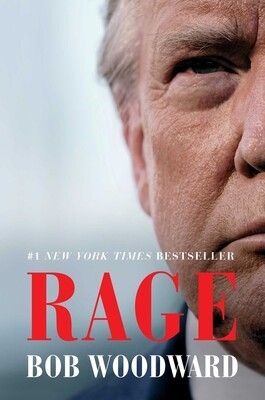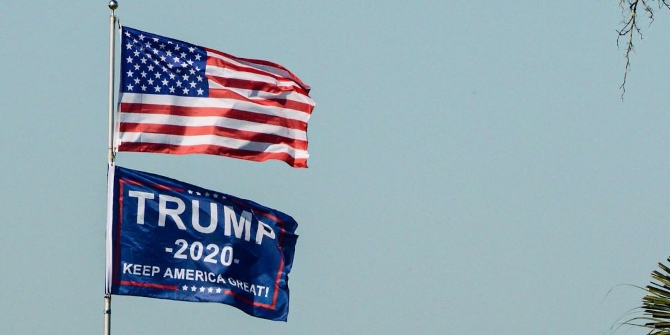Rage by Washington Post veteran Bob Woodward documents the first three-and-a-half years of Donald Trump’s presidency. Drawing from 17 interviews Woodward secured with Trump, the book ends with a discussion of the early stages of the COVID-19 pandemic. The book is an impressive piece of contemporary history, yet Robert Ledger and Peter Finn find that it is sometimes hard to fully penetrate the rambling material garnered from the interviews with Trump.
 Rage. Bob Woodward. 2020. Simon & Schuster.
Rage. Bob Woodward. 2020. Simon & Schuster.
Bob Woodward’s latest book on the presidency of Donald Trump, Rage, is a departure from its predecessor, Fear, in so far as it–perhaps surprisingly–was written with the cooperation of the president. Over the course of 17 interviews, Woodward charts Trump’s opinions on a wide range of topics, including the development of the coronavirus pandemic. In fact, the book is remarkably current for a piece of political history; the last interview was completed this past summer.
Woodward is one of the best-known political journalists and writers in the US. He assured his place in American history with his key role in investigating the Watergate scandal of the 1970s, which helped bring down the presidency of Richard Nixon, alongside Carl Bernstein at The Washington Post. Woodward has written several books on nine US presidents and his judgement on their performance carries a weight and significance rarely matched by other writers. Woodward makes clear his view that Trump marks a significant break from his predecessors in style and outlook.
If Fear charted the early phrase of the Trump presidency, detailing the chaotic nature of decision making in the Oval Office, the structure of Rage is somewhat different. The early chapters of Rage, the title of which is drawn from an acknowledgment by the President that he brings out the emotion in some, heavily feature the role of Secretary of Defense between 2017-19, Jim Mattis, as well as the administration’s early bombast towards North Korea. The second part of the book is primarily focused on first-hand interviews with Trump and the unravelling coronavirus crisis during 2020.
President Trump is shown, unsurprisingly, to be obsessed with both Robert Mueller’s investigation into Russian interference in the 2016 election and the January impeachment proceedings resulting from the Ukraine scandal. While Woodward presses Trump repeatedly on the latter issue in a vain attempt to show why tying military aid to Ukraine with a probe into the business dealings of the son of his political rival Joe Biden caused such consternation, the author also played down the significance of the former. This matters given Woodward’s unique experience into presidential scandals and impeachment during the Nixon era. Nevertheless, the book demonstrates how Trump was in a strong position after his impeachment acquittal by the Senate. Unfortunately for the president, however, the COVID-19 pandemic followed shortly afterwards.
The interviews with Trump are set out in all their excruciating detail. The president is portrayed as a disorganized personality who falls back on a few well-established prejudices on security, alliances and trade that will be familiar to most readers. Woodward himself comes across as a frustrated, sometimes hectoring and often perplexed interviewer. The writer’s dubious opinion towards the president, most notably on his approach to policy as well as checks on Trump’s numerous false statements, are briefly laid out in commentary within the interviews. Ultimately, the veteran journalist was unimpressed by what he saw: “When his performance as president is taken in its entirety, I can only reach one conclusion: Trump is the wrong man for the job.” (p. 392)

A large portion of Rage, similarly to Fear, is dedicated to the Trump administration’s efforts to disarm or at least reduce the threat of North Korea. A number of personal letters are included between Trump and North Korea’s dictator Kim Jong-un, which are almost surreal, often verging on the comical, in tone. The president is shown to be almost enamoured with the despot, a trend towards authoritarianism that comes out in other parts of the book. As for the US relationship with North Korea, for all his histrionics Trump has little to show for four years of psychodrama with Kim.
Perhaps most pertinent for readers who pick the book up this year will be the president’s response to the coronavirus crisis. His interviews cover China’s role in the crisis and unwillingness to accept visits from the US Centre for Disease Control early in the outbreak in Wuhan, Trump’s decisions to shut down the country in March and then frustration when the pandemic spirals out of control and the economy sinks at the same time. The later interviews show how Woodward repeatedly seeks policy clarification on the response to the pandemic, with the president seemingly unwilling to accept the dire reality of the situation.
The strength and weakness of the book are essentially the same: the access to the president. We get a closer insight into Trump’s views on, for instance, North Korea and how early he was, in fact, in taking the threat of the coronavirus seriously in private. Yet, reading the interview material can be frustrating. Trump’s thoughts are often incoherent, and he rarely directly answers Woodward’s questions. Although the author skilfully structures the narrative, the book contains less analysis than its predecessor, which had no interviews with Trump. The book’s structure is also a little inconsistent, with a focus on the early and late phases of Trump’s term, but with only thin coverage of 2018-2019. The implications of the 2018 midterms, for instance, are not discussed.
Rage is an important book. The interviews with Trump, as well as the letters with Kim, are intriguing primary sources and provide unique insight into the president’s method, such as it is. Woodward is a master craftsman who skilfully guides the reader through the maelstrom of the Trump presidency, although some may be left wanting more discussion. Although this is not the definitive book on the Trump presidency (that is still to be written), Rage is a key addition to the literature on the subject.
- Image: Photo by Dalton Caraway on Unsplash
Please read our comments policy before commenting.
Note: This article gives the views of the authors, and not the position of USAPP– American Politics and Policy, nor of the London School of Economics.
Shortened URL for this post: https://bit.ly/37YpmsD
About the reviewers
Peter Finn – Kingston University
Dr Peter Finn is a multi-award-winning Senior Lecturer in Politics at Kingston University. His research is focused on conceptualising the ways that the US and the UK attempt to embed impunity for violations of international law into their national security operations. He is also interested in US politics more generally, with a particular focus on presidential power and elections. He has, among other places, been featured in The Guardian, The Conversation, Open Democracy and Critical Military Studies.
Robert Ledger – Schiller University
Robert Ledger has a PhD in political science from Queen Mary University of London. He has worked for the European Stability Initiative, a think-tank in Brussels, lectured at several universities in London and currently lives in Frankfurt am Main. He is a Visiting Researcher (Gastwissenshaftler) in the History Seminar at Goethe University and also teaches at Schiller University Heidelberg and the Frankfurt School of Finance & Management. He is the author of Neoliberal Thought and Thatcherism: ‘A Transition From Here to There?’.






